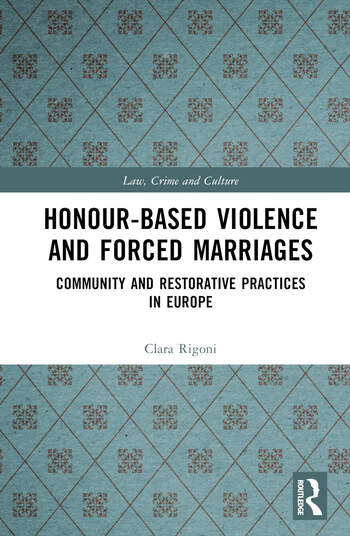
Review by Maryam Ghasemnejad, University of Göttingen, Germany
Publisher: Routledge, 2022
Length: 284 pages
Honour-based Violence and Forced Marriages: Community and Restorative Practices in Europe by Clara Rigoni explains issues that are truly relevant in our modern world. The book is mostly about such urgent matters as violation of human rights (especially those of women and children) in gender-based violence. Rigoni analyzes reasons for, features, and consequences of various kinds of violence that women throughout the world experience. She also considers the most common methods of fighting against such crimes, describes positive and negative sides of traditional judicial and legislative systems, and mechanisms of alternative dispute resolution, which many countries have begun to implement in their practice.
The book is divided into three parts and nine chapters. The first part is called “Theoretical and Conceptual Framework.” The introduction elucidates the importance of law and reveals the key purpose of the study that informs the chapters, which is finding out whether modern state law is able to solve modern social problems. The second chapter, “Law, Crime, and Culture,” discusses the close interconnection between these three phenomena. There is a focus on the destructive influence of harmful traditional practices such as honor-based violence and forced marriages on women’s and children’s rights, which can occur within some communities. The next chapter discusses three elements that characterize the links between law, crime, and culture. The chapter on the response of European countries shows that strong responses regarding violence against women and children have been endorsed in the legislative domain in Europe; however, they are not ideal, risking stigmatizing the communities without taking the specific conditions of violence into consideration. It is clear from the first part that Rigoni aims to find out whether alternative solutions related to honor-based violence and forced marriages exist and whether they are able to avoid the flaws of responses based on criminal law and the problems, connected with mechanisms of alternative dispute resolution, is positive.
“Case Studies” is the second part of the book. The key research methods (for instance, in-depth interviews with experts and victims of violence), which are used in the study, are highlighted here. Rigoni discusses the sensitivity and limitations of the study in its analyses on which it focuses, Norway and the United Kingdom. For example, the Norwegian victims and their families did not mind being interviewed by the researchers, while the British ones refused to do it for fear of being hurt a second time. So, given the limited number of cases, the study does not aim to generalize but to demonstrate that the topic needs further investigation and exploration. The cases, which were investigated in the UK and Norway, show that the process of tackling honor-based violence and similar incidents has been institutionalized since the end of 20th century. There are two distinctive offences that are distinguished in both countries: forced marriage and controlling behavior. Norway was the European pioneer in criminalizing forced marriage in 2004, while the UK managed to do it only in 2014 after lengthy debate. However, despite these differences, both countries have effective mechanisms aimed at fighting gender-based violence. There are different mechanisms that Rigoni has identified in the book. The first is the application of the alternative dispute resolution mechanism, which can be used in cases that involve violence against women. The other one is skepticism where mediation and conciliation are done within ethnic and immigrant communities, and state authorities have little control. Among the main concerns should be the safety of women and empowerment. A multi-agency approach must be adopted which will ensure that the victims are taken care of from different perspectives.
“Findings and Conclusions” is the last part of the book, which provides the readers with a comparative overview of the findings, describes the risks related to the use of alternative dispute resolution mechanisms, and the level of their implementation in the UK and Norway. One of the most important conclusions is the idea that nowadays states consider the cooperation of civil society as one of the best methods of fighting crime. The same situation pertains to alternative dispute resolution mechanisms. The research provided positive aspects, which can be the result of collaboration between the above-mentioned mechanisms and traditional state institutions and agencies in Europe. However, the ways of achieving that cooperation need specifying. Rigoni mentions that the peculiarities of the existing legislative and criminal justice systems should be taken into consideration by experts. Furthermore, it is crucial for both law practitioners and members of society to work together. The differences between various groups should always be taken into consideration justice in order to ensure equal access to social justice for all groups.
The book ends on a positive and optimistic note. Rigoni admits that there are many questions concerning tackling violence in all its manifestations that she has not addressed. She also shows, using the examples of Great Britain and Norway, that a great deal of work has already been done. For instance, in Britain, community organizations support the police the Crown Prosecution Service, the health service, social services and victim support services, among others. Such agencies are important as they train state organizations how to deal with honor-based violence and at the same time work as partners. Similar efforts are seen in Norway, where the multi-agency approach has greatly assisted the addressing of honor-based violence. Rigoni emphasizes the necessity of cooperation between nations in order to share their unique experiences and ideas so that the number of cases of violence diminishes. In showing that this can be possible only if there is a healthy symbiosis of community and state mechanisms of response to the violence, this book offers insights and ideas to scholars in women’s studies, criminology, sociology, law, and anthropology, as well as policymakers, and practitioners working with cases of honor-based violence.
Maryam Ghasemnejad is a researcher in the field of Iranian studies at the University of Göttingen focusing on the women situation in Iran and Afghanistan and honor-based violence in these societies.
